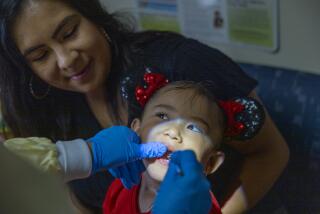Dental School Students Need a Psych Class Too
- Share via
I went to see my dentist the other day, and within minutes she had me teary-eyed.
No, it wasn’t that metal thing with the sharp point.
“Nobody likes us,” she said.
“That’s not true,” I told her, wincing--not from pain, but from telling a fib.
“It is true,” she said. “You know what the first thing some people say when they come in is? ‘I hate going to the dentist.’ Do you know how that makes you feel?”
Let’s see. You’re in a profession where you think you’re contributing something to society, and yet lots of people put you down.
Nope, can’t relate to that at all.
“I’m sure people appreciate what you do,” I said. “They just don’t tell you.”
She didn’t believe me. “You never read anything good in the paper about dentists,” she said.
I racked my brain to recall a story that would soothe her, but couldn’t. I tried another tack. “Surely, they prepare you for this kind of thing in dental school.”
She shook her head. You learn all the nuts and bolts of dentistry, she said, but not how to deal with the not-so-subtle rebukes.
It wasn’t the best setting to carry on a conversation, so we let it rest. But the memory of her plaintive cry didn’t go away.
Wouldn’t it seem logical for dental schools to gird prospective dentists for the slings and arrows that await them?
Let’s face it, “root canals” and “pulling teeth” and “a trip to the dentist” have been macabre punch lines for years.
I once had a hygienist who, noticing me writhing in the seat during a simple cleaning, said in a kindly voice, “I know you don’t like this.”
I always wanted to retort, “What, I’m some kind of odd duck? Are you telling me there are people who enjoy having a sharply pointed metal pick scrape their teeth and gums?”
Picking, Probing Not a Way to Make Friends
It caught me by surprise years ago to read about high suicide rates among dentists. But when you think about the essence of the job--picking and probing in people’s mouths with metal devices--it’s not the most obvious way to make friends.
An article in the June issue of the Journal of the American Dental Assn. challenges the notion that dentists have higher suicide rates than other Americans.
“Since 1933, both the public and professional media have repeatedly portrayed dentists as being suicide-prone,” wrote a Texas dental school professor. “This message is repeated casually and accepted without supporting data . . .”
However, an article last year in the Dallas Morning News made reference to the dentist-suicide syndrome and cited “several studies” that indicated dentists have higher rates of suicide, depression, drug and alcohol abuse and burnout than other American workers.
The intent here isn’t to resolve that dispute. It’s to give a nod to the unique world in which dentists live and to offer a layman’s recommendation that dental schools perhaps give more thought to the psyches of their prospective graduates.
Orange County has more than 1,900 dentists, and its professional society has a “well-being committee” that hears a range of problems, says society president Joseph Renzi Jr., a Santa Ana pediatric dentist.
He doesn’t share my dentist’s general lament, but notes that “a lot of dentists, just because of the nature of the work we do, tend to be insular people, and a lot of them are introverted.” That personality type, Renzi says, is less apt to share problems and, therefore, can benefit from support groups.
His wife, Denise Habjan, is also a dentist and generally concurs with my dentist’s point. “You’d like to have people be more appreciative,” Habjan says. “If anything, I think we spend more time than ever explaining things over and over . . . I love what I do, but it definitely has its moments.”
America will never fall in love with its dentists. You just can’t get intimate with someone who insists on putting sharp objects in your mouth.
Still, I’m very tempted to give mine a hug the next time I see her.
*
Dana Parsons’ column appears Wednesdays, Fridays and Sundays. Readers may reach Parsons by calling (714) 966-7821 or by writing to him at The Times’ Orange County edition, 1375 Sunflower Ave., Costa Mesa, CA 92626, or by e-mail to dana.parsons@latimes.com.


